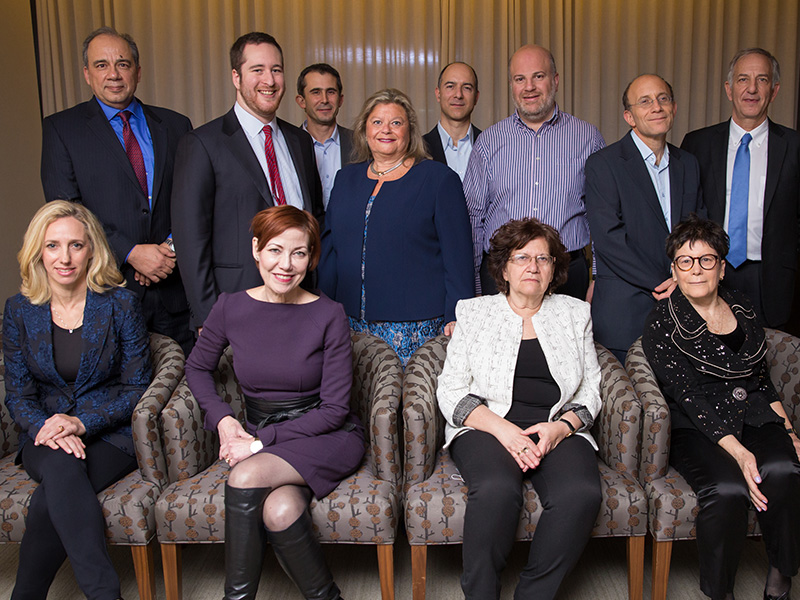A Canada-Israel cancer research collaboration needs further funding to support a second three-year stretch.
“Pancreatic cancer devastates its victims,” said Sylvia Soyka, who funded the initial project, “but in my experience, it stirs passion in the people close to them. Together we can use that passion to make a difference.”
The former Montrealer offers a prime example of the passion that can foster do-it-yourself philanthropy. In 2014, she launched and funded the Alex U. Soyka Pancreatic Cancer Project in memory of her father, who died in 2010 of the disease.
“In my quest to establish a meaningful legacy for my father, I was very lucky,” she said. “I conceived of a way to [combine] his unstinting support for the Hebrew University and its remarkable work with my own pride at being Canadian in my adopted city of Toronto.”
Speaking Dec. 6 to a group of about 50 people at the mid-town Toronto condo of Elise and Harvey Kalles, Soyka hoped to inspire others to carry on the project after her financial commitment ends in less than five months. Between $1 million to $2 million is needed for each of the next three years.
The Kalles’ daughter Corinne, lost her husband, Joe Goodbaum, to the disease last February.
The evening was hosted by Canadian Friends of the Hebrew University (CFHU), Pancreatic Cancer Canada and the Israel Cancer Research Fund.
Facilitated by CFHU, the Soyka project matched cancer researchers at the Jerusalem school’s Institute for Medical Research (IMRIC), the Sheba Medical Center in Tel Aviv and the Ontario Institute for Cancer Research (OICR).
While pancreatic cancer lacks the profile of its sibling maladies, it is in some ways more deadly. Its survival rate of eight per cent is the only single-digit rate of all major cancers, and researchers predict it will be the second-leading cause of cancer deaths by 2020.
Doctors struggle to diagnose the disease early. As a result, about 80 per cent of sufferers aren’t diagnosed until the disease has advanced. Alex Soyka’s experience is instructive: he died three months to the day after being formally diagnosed.
Libby Znaimer, who also shared her experience on Dec. 6, was more fortunate. The veteran journalist was part of the 20 per cent who are eligible for surgery and underwent a Whipple procedure, which removes part of the pancreas, part of the small intestine and the gallbladder. She emerged from the operation with a clean bill of health.
Steve Gallinger was one of her doctors and led the Toronto team in the Soyka collaboration
“CFHU does have basic scientists who are studying pancreas cancer, but they didn’t have as much of a clinical strength as we have in Toronto and also [Dr.] Talia [Golan] has at Sheba … And we have a lot of strength in genomics here in Ontario and Canada.”
Clinical strength, with its access to patients, allows physicians to obtain tumours, blood and clinical data, and also to experiment with new drugs, said Gallinger, who holds positions at OICR and the Samuel Lunenfeld Research Institute at Toronto’s Mount Sinai Hospital.
Gallinger’s work with IMRIC’s Shulamit Katzav -Shapira illustrates the point.
“Shula’s been studying a gene, vav one, for two decades, and she has more fundamental expertise in it. We have a large dataset of tumours that have been sequenced, and she wouldn’t have that. We sent her a bunch of tumours six months ago by courier. She actually brought them back with her now.”
Katzav-Shapira was one of six Israelis who visited Toronto last week. They met not only with Gallinger and his team but with Canadian scientists with whom they could partner on future ventures.
The other Israelis were IMRIC’s Dr. Ittai Ben-Porath, Dr. Rotem Karni and Rami Aqeilan, whose research focused on the basic biology of early pancreas cancer development; IMRIC’s Yuval Dor, who is investigating early diagnosis and monitoring effective treatment; and Dr. Golan, who partnered with Gallinger to understand resistance to personalized chemotherapy.
While the collaboration has paid dividends that have been recounted in medical journals, its success depends on experimentation and iteration – the antitheses of the quick fix that sufferers need, but at least a balm for the patient.
“We didn’t cure pancreatic cancer in the past three years, despite Sylvia hoping that we would, even though I told her it wouldn’t happen, but we’ve definitely made progress.”
